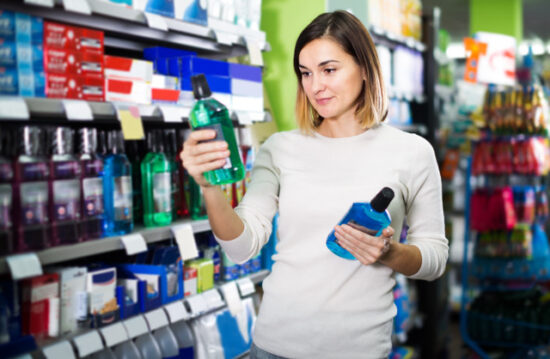
Most of us know that, when it comes to completing our daily oral hygiene routine, brushing and flossing are necessary. These measures help scrub away bacteria and prevent infections from forming. In addition to this, using mouthwash to rinse out your mouth is frequently advised by dentists. But is it really necessary?
Yes! Undoubtedly mouthwash has its benefits, but it does depend on which type of mouthwash is being used and the reason for using it. In this blog, we’ll dive further into detail about the pros and cons of mouthwash.
Should you have further questions about mouthwash in Millwoods, feel free to reach out to our neighborhood dental clinic today. Our wonderful staff is at your service!
The Benefits of Mouthwash
There is a reason why dentists repeatedly advise their patients, both old and young, to use mouthwash: because it’s advantageous to your oral health! Such benefits include the following:
- An extra measure of cleaning – Essentially, mouthwash is meant to compliment brushing and flossing, washing away lingering debris that you may have missed before. Swishing it around your mouth can also help clear out spaces you can’t scrub as effectively with a larger brush.
- Keeps your gums healthy – Bacteria can cause a lot of dental issues to manifest, including gum irritation and swelling. Mouthwash is a great way to keep this from happening.
- Healthier teeth – With fewer bacteria present, your teeth will be – and remain – healthier. Antibacterial mouthwash is especially great for this reason.
- Maintains your enamel – Your enamel is the protective layer on the surface of your teeth. It’s strong but not invincible and can be damaged by resilient debris. Certain mouthwashes help reinforce the structure of the enamel and ward off these bacteria from eroding it.
The Drawbacks of Mouthwash
As the saying goes, there are two sides to every coin, and this logic applies to using mouthwash as well. In some instances, it can also cause certain damage to your mouth and general health.
Here are some things you should be aware of before going ahead and shopping for mouthwash:
- Oral irritation – People have different sensitivity levels and for some, mouthwashes can unfortunately lead to a prickling or even burning sensation. It also interferes with the healing of canker sores and cuts in the mouth.
- Oral cancer – A few scientific studies have illustrated that alcohol mouthwashes can severely damage the soft tissues inside our mouths which, when left unaddressed for an extended period, can be a factor in the development of oral cancer.
- Tooth staining – Though your breath might be fresh, your teeth may end up appearing yellow, thereby impacting the aesthetic appearance of your smile.
- Eliminates good bacteria – Not all bacteria are bad! With that said, the chemicals in mouthwashes don’t distinguish between healthy and unhealthy bacteria, so it just wipes all of them out. This may end up reducing the overall health of your mouth and your body’s ability to effectively ward off infections and other illnesses.
Prior to committing to anything, always be sure to take your time to do research and book a consultation to thoroughly discuss things with your dentist in Millwoods. Your short and long-term dental hygiene is important to leading a happy life free of discomfort, pain, and worry.
Mouthwash with Alcohol
If you’re shopping at the drugstore in the hygiene aisle, you’ll most likely see a range of mouthwashes available for you – and the majority of them will contain alcohol, more specifically, ethanol. Ethanol is an effective germ and bacteria killer, which, in turn, stops plaque buildup and lowers your risk of developing gum disease. It also does wonders for your breath, helping you feel even more rejuvenated after brushing and flossing.
However, mouthwashes with alcohol can contribute to the development of oral health problems too. First, the percentage of ethanol in these liquids is typically around 25% – this is a fairly high concentration and can burn your soft tissues. Additionally, it can end up killing all the bacteria in your mouth, even the good ones!
Second, once you spit out the mouthwash, it can leave you with a dry mouth. Regular use of alcohol mouthwash and frequent dry mouth means little saliva production. As a result, your teeth aren’t washed of bacteria or bits of decay. Swallowing your food also becomes more difficult since it won’t slide down as smoothly.
Third, alongside the ethanol, chlorine may be present in the mouthwash too. A characteristic of chlorine is how salty it is and, though it may help eliminate germs, it can also discolor teeth and, in extreme cases, harm your tastebuds.
What Types of Mouthwashes to Use and Why
If you don’t feel comfortable using alcohol mouthwash but still want to incorporate it into your daily cleaning, there are many options out there for you to choose from, based on your needs and preferences:
Child-Friendly
Kids tend to swallow whatever they put in their mouths, so they shouldn’t be engaging with mouthwash before the age of 6. Mouthwash with fluoride can damage their smiles too if they’re used too often. Look for mouthwashes specifically designed for children (they contain no alcohol) and always be sure to talk to their dentist.
Contains Fluoride
The sodium fluoride included in this type of mouthwash works just like the fluoride you’re given during a dental cleaning: it’s very effective at preventing cavities. But please note: if you’re using fluoride mouthwash, you may want to consider a toothpaste without fluoride so that you don’t overexpose your smile to it as this can also lead to stains.
Therapeutic Mouthwash – Better Than Cosmetic Mouthwash
Though it may sound a bit strange, cosmetic mouthwash is primarily used to manage bad breath (also known as halitosis). Breath spritzers, which are small so you can keep them on you when you leave the house, are another variant of cosmetic mouthwash. Unfortunately, the effects don’t last too long and don’t really serve any other purpose. Cosmetic mouthwash can cover the symptoms of bad breath so dentists often recommend a quality therapeutic rinse which can address the underlying causes of halitosis.
Other Uses of Therapeutic Rinses
Therapeutic rinses are used to help control plaque buildup, which in turn reduces the risk of gum disease and decay. It is also used for fighting gingivitis which again is caused by plaque buildup and bacteria in the mouth.
Prescription Mouthwashes
Do you have serious gum disease or other oral conditions? Talk to your dentist about it. Prescription mouthwashes which generally contain an antibacterial called Chlorhexidine can help to treat redness, swelling, and bleeding caused by oral bacteria. Please follow the dentist and pharmacist instructions carefully and avoid using it for a long period as these mouthwashes can stain teeth. However, these are the most effective in treating serious oral health issues such as gum disease.
Come into Agape Dental Clinic Today!
It’s not a secret: using mouthwash on a regular basis is a good habit to get into, especially if you want your smile to be in tip-top shape.
Our experts are ready to welcome you into our clinic and guide you on your unique dental journey. Whether you’re wanting to inquire about purchasing and using mouthwash near you, a dental cleaning, or a more complex treatment, you can contact us whenever it’s best for you.
We hope to see you soon!

